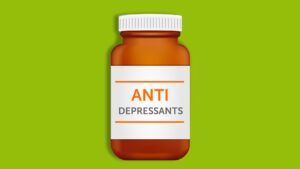If you are struggling with anxiety or OCD, you know how debilitating these conditions can be. You may have tried a variety of medications, but haven’t found the right one yet. In this comprehensive guide, we will discuss the best antidepressants for anxiety and OCD. We will also provide information on how to choose the best antidepressant for you, as well as dosage and side effects.
Contents
What Are Antidepressants?
 Antidepressants are a type of medication that help treat the symptoms of depression. They work by affecting neurotransmitters, the chemicals in your brain that can influence mood and emotions. Antidepressants are generally described as a drug that works to reduce the symptoms of depression by balancing out these neurotransmitters.
Antidepressants are a type of medication that help treat the symptoms of depression. They work by affecting neurotransmitters, the chemicals in your brain that can influence mood and emotions. Antidepressants are generally described as a drug that works to reduce the symptoms of depression by balancing out these neurotransmitters.
However, these are also effective in treating anxiety and OCD. As this works to balance the neurotransmitters, it can provide relief from symptoms of stress and anxiety.
It’s important to remember that it may take time to find the right medication and dose for you. Don’t be discouraged if the first antidepressant doesn’t work or isn’t the right fit – there are a variety of options that your doctor can work with you to find the best one for you.
What Are Some Best Antidepressants For Anxiety And OCD?
When it comes to treating anxiety and OCD, there are a variety of antidepressants available that can be effective. These medications are usually taken daily in pill, capsule, or liquid form and can be prescribed by your doctor. It takes several weeks before you start to feel the effects of an antidepressant as they work overtime to balance out the neurotransmitters.
There are some common types of antidepressants that are used to treat anxiety and OCD. These include:
- Selective Serotonin Reuptake Inhibitors (SSRIs)
- SNRIs
- Tricyclic Antidepressants
- Monoamine Oxidase Inhibitors (MAOIs)
In addition, here are the top 10 types of antidepressants for anxiety and OCD:
- Clomipramine
- Amitriptyline
- Sertraline
- Paroxetine
- Fluoxetine
- Venlafaxine
- Mirtazapine
- Escitalopram
- Fluvoxamine
- Nortriptyline
Each type of antidepressant will work differently for each individual. So it’s important to talk to your doctor or mental health professional about what the best option is for you. Only with the right medication and therapy, can you start to feel better and see an improvement in your symptoms.
Overall, these medications can be effective in treating anxiety and OCD. But they should always be taken under the direction of a doctor and lifestyle changes should be implemented to help manage symptoms. Additionally, it is important to remember that all medications can have side effects. So it’s important to discuss these potential risks and benefits with your doctor before starting any medication.
How Do Antidepressants Help In Anxiety And OCD?
 Usually, when people experience intense anxiety or symptoms of OCD, they may be prescribed an antidepressant medication to help manage their symptoms. Because when a person feels anxiety and OCD at the same time, they often have difficulty managing their emotions and behaviors. Antidepressants help to regulate the chemical imbalances in the person’s brain that contribute to both anxiety and OCD.
Usually, when people experience intense anxiety or symptoms of OCD, they may be prescribed an antidepressant medication to help manage their symptoms. Because when a person feels anxiety and OCD at the same time, they often have difficulty managing their emotions and behaviors. Antidepressants help to regulate the chemical imbalances in the person’s brain that contribute to both anxiety and OCD.
Antidepressant medications work by increasing the levels of serotonin, a neurotransmitter found naturally in the brain that promotes feelings of calmness and happiness. Serotonin helps regulate both mood and behavior. So increased levels can help reduce symptoms of anxiety and OCD.
In addition to helping regulate these chemicals in the brain, antidepressants also work by blocking certain types of nerve pathways that are believed to be involved in both anxiety and OCD. By doing this, the medications make it harder for obsessive thoughts and compulsive behaviors to take hold.
Although antidepressants can be very effective in treating anxiety and OCD, they are not a cure-all. It is important to work with your doctor or therapist in order to find the right medication that works best for you. And it may take some time before you start seeing results from your treatment plan.
Is Zoloft or Lexapro Better For OCD?
Zoloft and Lexapro are both selective serotonin reuptake inhibitors (SSRIs) and are used to treat OCD. Some doctors prescribe these medications as “off-label” which means they are prescribed for a condition not approved by the FDA. Both medications work in similar ways. But there are some differences that may make one better suited to a particular situation.
The main difference between Zoloft and Lexapro is how quickly they take effect. Zoloft starts working after about two weeks, while Lexapro takes effect after about four weeks. This means that if your symptoms are severe, you may want to opt for Zoloft since it works more quickly than Lexapro. And also, Zoloft is FDA approved for treating OCD in children, while Lexapro is not.
Another difference between these two medications is their potential side effects. Zoloft can cause more dizziness and drowsiness, while Lexapro is generally less sedating. Additionally, some people may experience fewer sexual side effects with Lexapro than with Zoloft.
It’s important to note that there is no definitive answer to which of these medications is better for OCD. Thus, if you have OCD, you should speak to your doctor about which medication is best for you. Your doctor can assess your individual needs and preferences when choosing the right treatment plan for you.
What Are Some Common Side Effects?
Even if you choose the best antidepressants for anxiety and OCD, there could be side effects that you should be aware of. Here are some common side effects of antidepressant medications:
- Nausea and vomiting – This can be a common side effect of many antidepressant medications.
- Weight gain or loss – Some people experience weight changes when taking antidepressants, including gaining or losing some pounds.
- Sleep disturbances – Antidepressants may affect your sleeping patterns, giving you difficulty falling asleep or staying asleep.
- Dry mouth – This side effect can be uncomfortable and may lead to tooth decay.
- Dizziness or lightheadedness – Some people report feeling dizzy or lightheaded after taking certain antidepressants.
- Sexual problems – Many people experience a decrease in sexual desire or other difficulties with sex while taking antidepressant medications.
- Blurred vision – Blurry or hazy vision can be a side effect of some antidepressants.
- Headache – Another common side effect is headaches, which may be mild to severe in intensity.
- Fatigue – While antidepressant medications are intended to make you feel better, they can also cause fatigue, making it difficult to stay alert and active.
It is important to discuss any side effects you experience with your doctor. They can help you adjust the dosage or switch medications if necessary. Additionally, there may be lifestyle changes and other treatments that can help reduce the intensity of these side effects.
There are also some more serious side effects associated with antidepressants, including an increased risk of suicidal thoughts, particularly in young adults. If you or someone you know experiences any suicidal thoughts or behaviors while taking antidepressants, seek help immediately.
Finally, it is important to remember that no two people respond the same way to antidepressant medications. As such, it can take some time and trial and error to find the best medication for your needs.
How To Choose The Right Antidepressants For Anxiety And OCD?
 If you are considering using antidepressants to treat anxiety or obsessive-compulsive disorder (OCD), it is important to find the type of antidepressant that is right for you. Your doctor may recommend a selective serotonin reuptake inhibitor (SSRI) or another type of medication.
If you are considering using antidepressants to treat anxiety or obsessive-compulsive disorder (OCD), it is important to find the type of antidepressant that is right for you. Your doctor may recommend a selective serotonin reuptake inhibitor (SSRI) or another type of medication.
However, here are some tips that can help you a bit to choose the right antidepressants for anxiety and OCD. These include:
- Talk to your doctor: One of the best ways to determine which type of antidepressant is right for you is to have an honest discussion with your doctor about any concerns that you might have. Your doctor should be able to help guide you in selecting the correct medication and its dosage.
- Consider side effects: When choosing an antidepressant, it is important to consider the potential side effects of each option. Your doctor should be able to provide you with information about possible side effects so that you can make an informed decision.
- Review your symptoms: Before choosing an antidepressant, review your specific symptoms and how they are affecting your life. This will help your doctor determine which type of medication is best for you.
- Ask about other treatments: In some cases, lifestyle changes and therapy can be more effective than drugs in easing your anxiety or OCD symptoms. Talk to your doctor about the possibility of combining medications with behavioral strategies for better results.
- Be patient: Finally, remember that it may take several weeks or even months to find the right medication and dosage for your needs. Don’t lose hope if the first option you try doesn’t seem to be working—there are many other options that may work better for you.
With these tips in mind, it is possible to find an antidepressant that works well for your anxiety or OCD. Just make sure to talk to your doctor and be open about your concerns. With the right medications and strategies, you can start feeling better soon.
Conclusion
In conclusion, the best antidepressants for anxiety and OCD could be SSRIs, SNRIs, MAOIs, and Tricyclic antidepressants. Each of these classes of medications has its own risks and benefits that should be carefully weighed before making a decision on which medication is right for you.
It’s important to talk to your doctor or psychiatrist about any concerns you may have before beginning a new medication regimen, as well as any potential side effects. Additionally, lifestyle changes, such as engaging in regular exercise and practicing relaxation techniques, can help to improve symptoms of anxiety and OCD without the use of medication.
Take care, and don’t forget that you are not alone! OCD is a mental health disorder characterized by obsessions and compulsions. If you have any queries regarding OCD treatment, ERP therapy experienced therapists at OCDMantra can help: Book a trial OCD therapy session


